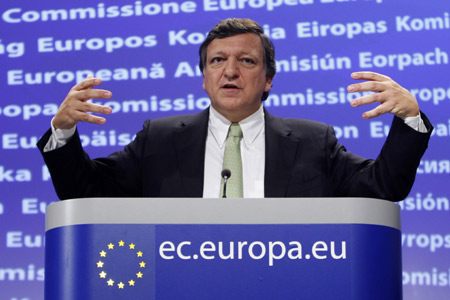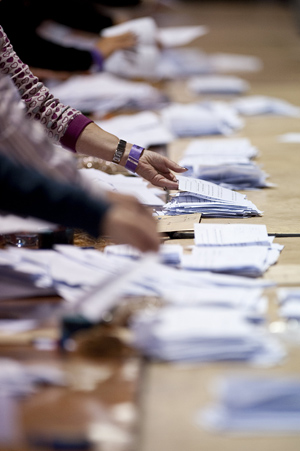Ireland passes EU's Lisbon Treaty
 |
|
European Commission President Jose Manuel Barroso comments on the results of the Irish referendum on the Lisbon Treaty during a news conference at the EU Commission headquarters in Brussels, October 3, 2009. [Xinhua/Reuters Photo]? |
Irish voters approved the European Union (EU)'s Lisbon Treaty in a second referendum on Saturday with 67.1 percent in favor, paying way for the integration of the EU.
A majority of voters in 41 of Ireland's 43 constituencies voted for the treaty in Friday's plebiscite, according to the results released by Ireland's electoral office.
Irish Taoiseach Brian Cowen said credit for the result rested with the Irish people who had shown a determination to be at the center of Europe. "We will now work with all our partners in ensuring the reforms this treaty will bring are implemented."
OVERWHELMING MAJORITY
Ireland has voted in favor of the Lisbon Treaty by 67.13 percent to 32.87 percent, reflecting a 20.5 percent swing to the Yes side since the June 2008 referendum.
In the first Lisbon Treaty poll, the No side secured 53.4 percent of the vote.
|
|
|
Votes are counted for the Lisbon Treaty referendum at the Royal Dublin Society (RDS) in Dublin, Ireland. October 3, 2009. Irish voters appear to have backed the European Union's Lisbon reform treaty, government and opposition officials said on Saturday.[Xinhua/AFP Photo] |
Referendum returning officer Maurice Coughlan declared that the number of Yes votes was 1,214,268 and that 594,606 had voted No.
Of the 43 constituencies, only Donegal North East and Donegal South West voted against the Lisbon Treaty, and national turnout is 59 percent, higher than the 53.13 percent for the first referendum.
Dublin South recorded the highest support for the treaty, with 82 percent of ballots in favor. This was closely followed by Dn Laoghaire, which had an 81 percent Yes vote.
Across all 12 Dublin constituencies support for the treaty was 69 percent, with a turnout of 59.3 percent.
The observers said the result represents the highest Yes vote in a referendum on Europe since the Maastricht Treaty in 1992, and the turnout was the highest in a European referendum since the original vote on joining the then EEC in 1972.
AT THE HEART OF EUROPE
Speaking on the steps of Government Buildings, Irish Prime Minister Brian Cowen confirmed that the Lisbon Treaty would be carried "decisively" and the electorate had "done the right thing for our own future and the future of our children."
He said the Irish people had "spoken with a clear and resounding voice" and declared their intent "to remain at the heart of Europe where our future belongs."
The Irish people had taken "a decisive step for a stronger, fairer and better Ireland and a stronger, fairer and better Europe" and it was "a good day for Ireland and a good day for Europe," he said.
Cowen claimed that the "resounding" backing for the Lisbon Treaty had sent a message to other countries in the EU that "we stand with them as we seek to move forward together."
The challenge now was to work "with all our partners to ensure that the reforms this treaty brings will be implemented," he said, noting that climate change, cross border crime and economic difficulties are key areas which would need to be addressed.
However, Sinn Fein President Gerry Adams said the Irish political establishment had ignored the decision of the Irish voters after the first Lisbon Referendum and they would regret the day they ignored the views of "No" voters this time.
PAVE WAY FOR EU INTEGRATION
The charter must be ratified by all 27 EU member states and Ireland is the only EU member state to hold a referendum. Therefore, the "Yes" result in the second referendum will improve decision-making in the EU and help European integration. The Presidency of the European Union (EU) Sweden on Saturday hailed the "Yes" result of the Irish second referendum on the Lisbon Treaty.
"Today is a good day for Europe. I am very pleased about the very positive outcome of the Irish referendum on the Lisbon Treaty," said Swedish Prime Minister Fredrik Reinfeldt after hearing the positive result of the Irish referendum.
"Europe has listened to -- and acted on -- the concerns of the Irish people. This is European cooperation at its best. Once in place, the Lisbon Treaty will make the enlarged union more democratic, efficient and transparent," said Reinfeldt.
He understood that Polish President Lech Kaczynski would sign the legal act shortly. Czech Prime Minister Fischer and European Commission President Barroso will meet at a meeting in Brussels next Wednesday to discuss the issue. Reinfeldt will also send Minister for European Affairs Cecilia Malmstrom to the Czech Republic on Thursday to check if there is any conflict between Czech's constitution and the treaty to facilitate for an early sign from the Czech Republic.
Polish Prime Minister Donald Tusk said he hopes his country will ratify the treaty "very quickly" so they are not seen to be slowing the process down.
 0
0 







